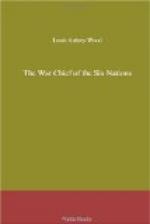There is some obscurity surrounding the identity of Thayendanegea’s father, but it is generally agreed that he was a full-blooded Mohawk and a chief of the Wolf clan. [Footnote: The Mohawks were divided into three clans—the Tortoise, the Bear, and the Wolf.] By some writers it is said that he bore the English name of Nickus Brant. Others say that Thayendanegea’s father died while the son was still an infant and that the mother then married an Indian known to the English as Brant. By and by, as Thayendanegea mingled with the English, he acquired the name of Joseph, and so came down through history as Joseph Brant; but whether he acquired this name from his father or from his step-father we cannot tell, and it does not really matter. We shall know him hereafter by his English name.
In the traditions of the Mohawk valley it is told how one day a regimental muster was being held, in Tryon county, in the colony of New York, at which William Johnson was present. Among the throng of those who were out to see the sights was Molly Brant, Joseph’s elder sister, a lively, winsome girl of sixteen years. During the manoeuvres a field-officer rode by, mounted on a spirited steed. As he passed, Molly asked if she might get up behind. The officer, thinking it a bit of banter, said she might. In an instant she had sprung upon the crupper. Away went the steed, flying about the field. Molly clung tight to the officer, her blanket flapping in the breeze and her dark hair floating wide. Every one burst into merriment, and no one enjoyed the spectacle more than Colonel William Johnson himself. A flame of love for Molly was kindled in his heart, and, being a widower, he took her home and made her his bride after the Indian fashion. It would seem quite natural, then, that the superintendent should be interested in the career of Molly’s brother Joseph. Born, as the young redskin was, of princely stock, he might, with such an advantage, be expected to attain to honour and dignity among the people of the Long House. There was, however, one obstacle; although Joseph’s father was a chief, he did not inherit rank, for it was the custom of the Six Nations to trace descent through the blood of the mother, and his mother, who had brought him over hill and water from the banks of the Ohio, was of humble origin. If Joseph wished, therefore, to rise among his fellows, he must hew out his own path to greatness. By pluck and wisdom alone could he win a lasting place in the hearts of his people. As we tell his story, we shall see how he gathered strength and became a man of might and of valour.




